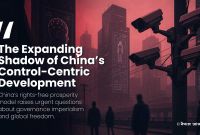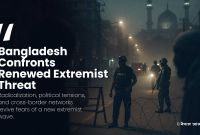Behind the chalkboard: Ex-teacher exposes China’s education system as tool of party indoctrination

China’s ruling Communist Party often boasts of a modern, high-performing education system that has lifted millions out of poverty and fuelled the country’s technological rise.
State media touts its STEM dominance, global rankings in math and science, and the meritocratic promise of the gaokao, the country’s rigorous college entrance exam.
But beneath that shiny surface lies another reality—one that former educators and dissenting voices say is stifling curiosity, punishing dissent, and turning classrooms into instruments of ideological control.
This month, a former schoolteacher from eastern China has reignited debate over the true nature of China’s educational priorities by publicly accusing the Chinese Communist Party (CCP) of turning schools into “ideological battlefields.”
In a series of widely circulated essays and interviews posted from abroad, the ex-teacher describes the system as “less about education, more about obedience,” and warns that the country’s youth are being “programmed, not taught.”
Her words have sparked rare online debate—most of it quickly censored—on the cost of an education system where political conformity often trumps critical thinking, and where loyalty to the Party has been baked into the curriculum from kindergarten onward.
From educator to dissident
The teacher, who has sought political asylum in an undisclosed Western country, worked for over a decade in China’s public school system.
Her identity remains partially anonymous for the safety of her family still in China, but she has emerged as one of the few insiders willing to publicly dissect how political indoctrination is embedded into what is often praised as a success story of mass education.
Speaking to independent Mandarin-language news outlets, she described being forced to lead “patriotic” flag-raising ceremonies, recite Party slogans, and monitor students’ political attitudes.
According to her, school staff were regularly briefed by local education bureaus on ideological “red lines” and given guidance on how to report students or parents who questioned government narratives.
Loyalty over learning
Since Xi Jinping rose to power in 2012, China’s schools have undergone sweeping ideological reengineering.
Under his vision of “education with socialist characteristics,” the classroom is no longer just a space for knowledge but a critical front in the Party’s long-term political project.
Textbooks have been rewritten to emphasise Xi’s leadership, the supremacy of socialism, and the “historic mission” of the CCP.
History lessons sidestep topics like the Great Leap Forward, the Cultural Revolution, or the Tiananmen Square massacre.
Political education classes—mandatory at all levels—teach students to revere the Party as the guardian of China’s national rejuvenation.
One of Xi’s hallmark policies has been the rollout of “Xi Jinping Thought on Socialism with Chinese Characteristics for a New Era” as a formal subject in schools and universities.
Children as young as seven are required to memorise passages from the doctrine.
University students must pass ideological assessments to graduate or qualify for scholarships.
The teacher-turned-whistleblower described a growing emphasis on “political hygiene” in classrooms, where students’ social media activity, associations, or even offhand remarks can lead to disciplinary action—or worse.
She said several of her colleagues were reprimanded or reassigned for failing to adequately “instil ideological values.”
A generation under surveillance
Chinese students are not just learning in an environment of political surveillance—they are living in one.
Schools across the country are equipped with high-tech monitoring systems: facial recognition cameras, AI-powered behaviour trackers, and even “smart uniforms” that record location data.
Officially, these tools are meant to improve discipline and campus safety.
In practice, critics argue, they help the state watch over its youth with unprecedented reach.
Parents, too, are drawn into the ideological orbit.
Patriotic education extends beyond the classroom, with campaigns encouraging families to support the Party’s vision, report “problematic behaviour,” and celebrate national holidays with politically themed activities.
The teacher recalled moments when parents were summoned to meetings if their children expressed “incorrect opinions” about current events or foreign affairs.
According to the whistleblower, such pressure creates a suffocating culture in which students learn to self-censor at an early age.
The chilling effect on teachers
For educators, the ideological tightening has created a precarious atmosphere. Teachers are expected not just to teach but to model loyalty.
Political evaluations now factor into promotions and bonuses. Many schools have adopted “morality scores” for staff, evaluating not just professional competence but ideological performance.
Numerous teachers have been disciplined or dismissed in recent years for posting politically sensitive comments on social media, attending private religious services, or discussing banned topics in class.
A few have been criminally charged under China’s expansive laws on “picking quarrels” or “subverting state power.”
The ex-teacher recalled that after a lesson in which she discussed different government systems around the world, she was reprimanded by the principal and told to “avoid confusing students with Western ideas.”
Indoctrination as national strategy
The growing focus on ideological conformity in schools is part of a broader campaign to inoculate Chinese society against what the Party views as “hostile foreign values.”
Officials frequently warn of “Western infiltration” through textbooks, social media, and foreign teachers.
International schools operating in China have come under pressure to align curricula with domestic standards, while foreign textbooks have been replaced with censored, state-approved versions.
In this environment, education is no longer merely about human capital—it is a form of political capital.
The goal, according to many observers, is to create citizens who are not just productive but politically obedient.
This vision may explain why China’s education system, despite its academic strengths, consistently ranks low on global indices of academic freedom, creativity, and freedom of thought.
Scholars have noted that while Chinese students excel in standardised testing, they are less likely to challenge assumptions, debate ideas, or engage in open inquiry.
Dissent in the diaspora
The former teacher’s decision to speak out has won praise from overseas Chinese dissidents and education advocates, who say her testimony aligns with growing concerns about political indoctrination in China’s classrooms.
Still, such dissent remains risky.
She believes she would have faced arrest had she gone public while still in China. Her family members have already been questioned, she says, and warned not to “collaborate with foreign media.”
However, she insists her decision was not political but moral, and her story offers a rare glimpse behind the polished facade of China’s education model.




![From Kathmandu to the World: How Excel Students Are Winning Big [Admission Open]](https://www.nepalaaja.com/img/70194/medium/excel-college-info-eng-nep-2342.jpg)
